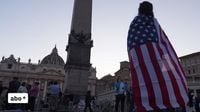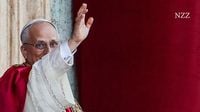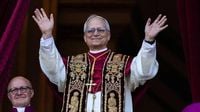Pope Leo XIV, the first American pontiff, has already stirred up controversy even before his official inauguration. Robert Francis Prevost, a 69-year-old from Chicago, was elected as Pope Leo XIV less than three weeks after the death of his predecessor, Pope Francis. His election has been met with both celebration and skepticism, particularly among supporters of former President Donald Trump.
Upon Prevost's election, Trump expressed his excitement, calling it a "great honor for our country" and stated, "I look forward to meeting Pope Leo XIV. It will be a very significant moment!" However, not everyone in Trump's circle shares this enthusiasm. Laura Loomer, a far-right activist, labeled the new pope as "Anti-Trump, Anti-MAGA, for open borders and a total Marxist like Pope Francis" following a social media post that allegedly criticized Trump.
Prevost's social media history has drawn scrutiny, particularly a post that shared a 2015 article by Cardinal Timothy Dolan of New York, which argued against Trump's anti-immigration rhetoric. This article, titled "Why Donald Trump's anti-immigration rhetoric is so problematic," highlights the pope's values of social justice and compassion for migrants, which starkly contrast with the current U.S. administration's policies.
In February, Prevost's account also shared a piece from the National Catholic Reporter criticizing Vice President JD Vance's interpretation of the Christian concept of "ordo amoris"—the idea that love should be prioritized for family and community over others. The article concluded, "JD Vance is wrong: Jesus does not ask us to rate our love for others." This has led some Trump allies to hope that perhaps a younger person managed Prevost's account without his knowledge, as expressed by former Fox News host Megyn Kelly.
Experts believe that Pope Leo XIV could significantly influence American Catholics, but the reception among Trump supporters remains uncertain. Thomas Jäger, a professor of international politics at the University of Cologne, noted, "The Pope will have a big influence on U.S. Catholics, except for those who see Trump as the savior." Rafael Walthert, a professor of religious studies at the University of Zurich, cautioned that the Pope should avoid becoming too embroiled in political conflicts, as it could damage his reputation as a spiritual leader.
As the first American pope, Prevost's election has raised questions about his potential role in the heated political climate of the U.S. His values, emphasizing social justice and a rejection of nationalism, directly oppose the hardline stances of the Trump administration. This has led to speculation about whether he will become a countervoice to Trump.
In his inaugural address, which he delivered in Italian, Spanish, and Latin—omitting English—Prevost emphasized his commitment to compassion and social justice. His previous remarks have already indicated his stance on migration, including a recent post criticizing Trump and El Salvador's President Nayib Bukele for their harsh immigration policies.
On May 18, 2025, Prevost will have a chance to engage directly with JD Vance during his inauguration service, where both Trump and Vance are expected to attend. How they will react to Prevost's positions and whether they will continue to support him remains to be seen.
Internationally, the election of an American pope has generated a variety of responses. Peruvian President Dina Boluarte hailed it as a "historic moment for Peru," given Prevost's long history of missionary work in the country. UN Secretary-General António Guterres called for continued collaboration between the UN and the Vatican, emphasizing the need for voices advocating for peace and social justice in the world.
European leaders have also expressed optimism about the new pope. German Chancellor Friedrich Merz wished him strength and health, while French President Emmanuel Macron called the election a "historic moment for the Catholic Church," hoping it brings peace and hope. Polish President Andrzej Duda expressed readiness to strengthen ties between Poland and the Catholic Church, while Ukrainian President Volodymyr Zelensky hoped for continued moral support from the Vatican in achieving peace.
However, within the U.S., the reaction from Trump supporters has been mixed. Many are concerned that Prevost will not align with their values. Loomer and others have labeled him as "woke" and a "total Marxist," expressing fears that he may promote open borders and progressive policies that contradict their beliefs.
Prevost's brother, John, confirmed that migration is a significant concern for the new pope, stating, "He thinks that the country is moving in the wrong direction on this issue." This aligns with the pope's previous criticisms of Trump's immigration policies, which he described as a disgrace.
As the political climate continues to evolve, the dynamics between Pope Leo XIV and the Trump administration will be closely watched. With the pope's commitment to social justice and compassion, the potential for conflict appears inevitable, especially among those who view Trump as a savior.
As the inaugural service approaches, many are left wondering how the relationship between the Vatican and Washington will unfold. Will Prevost's American identity lend more weight to his words in the U.S. than those of his predecessor, Pope Francis? Or will he face backlash from those who feel threatened by his progressive stance?
For now, the world awaits the first public address of Pope Leo XIV, anticipating how he will navigate the complex intersection of faith and politics in a deeply divided America.



